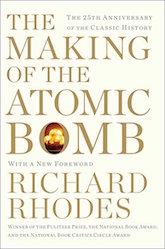My favourite opening of any book ever is the first paragraph of Richard Rhodes’s masterful nonfiction giant, The Making of the Atomic Bomb. Whenever I am asked about my favourite books, I read it aloud. You should do the same. Go on. I’ll wait.
In London, where Southampton Row passes Russell Square, across from the British Museum in Bloomsbury, Leó Szilárd waited irritably one gray Depression morning for the stoplight to change. A trace of rain had fallen during the night; Tuesday, September 12, 1933, dawned cool, humid and dull. Drizzling rain would begin again in early afternoon. When Szilárd told the story later he never mentioned his destination that morning. He may have had none; he often walked to think. In any case another destination intervened. The stoplight changed to green. Szilárd stepped off the curb. As he crossed the street time cracked open before him and he saw a way to the future, death into the world and all our woe, the shape of things to come.
Szilárd, a Hungarian physicist, has just invented the chain reaction that makes liberation of atomic energy possible—it takes Rhodes a while to get to that. But that paragraph has already set off ideas colliding and splitting and exploding in our brains. I love everything about it: the perfect cadence, the confident sketch of grey rainy London, the hint of Szilárd’s inner turmoil—and most of all, the sudden transformation of the mundane into the wondrous. Rhodes may be writing what he calls verity, applying the craft of fiction to real events, but that moment captures the very heart of science fiction.
Buy the Book


The Making of the Atomic Bomb
It is fitting that science fiction was also the stray neutron that triggered Szilárd’s explosive revelation. In 1932, he was at a turning point in his career, crippled with self-doubt. A new refrigerator design he had invented with Einstein himself was a commercial failure, and he considered abandoning physics altogether. (Yes, Albert Einstein dabbled in refrigerators, but that’s another story…) Then a friend gave Szilárd a book by H.G. Wells: The World Set Free, written in 1913. It features an explosive device based on radioactive materials, small enough to be dropped from an aircraft, and capable of destroying an entire city… called the atomic bomb. In an uncanny prophetic twist, Holsten, the fictional scientist who figures out how to liberate atomic energy in the novel, does his work in London’s Bloomsbury, in the distant future of 1933!
After finishing the book, Szilárd immediately decided to devote his life to nuclear physics—to save humankind from destruction, and to develop the means “that would enable man not only to leave the earth but the solar system”, as he said in an interview. At the time, most mainstream physicists like Ernest Rutherford didn’t believe that atomic energy would ever be practical. But Wells’s vision convinced Szilárd otherwise. Later, he even credited Wells as the true father of the atomic bomb.
In Wells’s novel, the threat of atomic weapons leads to the formation of an Utopian world government. (Incidentally, Wells himself was involved in setting up the ill-fated League of Nations—which made him an irresistible model for Prime Minister West in my novel Summerland.) Szilárd wanted to make Wells’s vision a reality. But the Second World War intervened. Szilárd and Einstein wrote their famous letter to Roosevelt, kicking off the Manhattan Project. In 1945, in spite of Szilárd’s petition for a bloodless demonstration, atomic bombs fell on Hiroshima and Nagasaki. Rhodes covers their horrors in detail, unflinchingly showing the dark side of Szilard’s transcendent vision.
Eighty-five years later, we still haven’t made our way past that crack in time, and our ultimate destination remains unknown. But through the power of Rhodes’s words, we can imagine how Szilárd felt that fateful morning; and, like him, turn to science fiction to dream of brighter things to come.
 Hannu Rajaniemi is a mathematical physicist, science innovator, and author of the Jean Le Flambeur trilogy, from Finland. His new novel Summerland is available June 26th from Tor Books. He currently resides in California.
Hannu Rajaniemi is a mathematical physicist, science innovator, and author of the Jean Le Flambeur trilogy, from Finland. His new novel Summerland is available June 26th from Tor Books. He currently resides in California.










